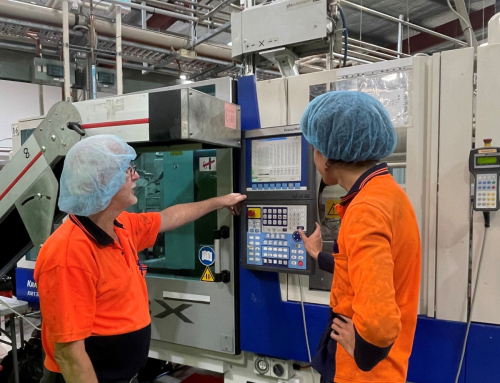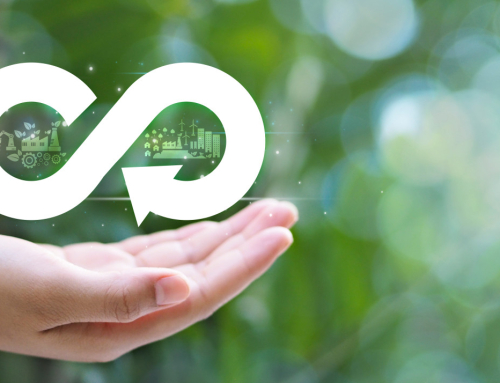W&S Plastics: An Interview with Managing Director Andrew Wiseman
W&S Plastics is a success story in Australian manufacturing. Since its humble beginnings in 1978 in Sydney’s southwestern suburbs, this multi-generation, family-owned company has expanded significantly, adapting, thriving and stepping up to meet the community’s needs during the challenging times of the COVID-19 pandemic.
As we celebrate Australian Made Week, Managing Director Andrew Wiseman shares insights into the company’s journey, achievements and continued success.
Q: Commencing as a small Australian family-owned manufacturing company in 1978, did it take long for the W&S Plastics business to grow?
Andrew Wiseman: We commenced operations in Peakhurst in 1978 and in 1982 W&S Plastics moved to Bankstown and soon took over another factory next door, effectively doubling our footprint. By 2001 we had outgrown those premises and moved to Moorebank, where we operated about 20 injection molding machines. We have continued to expand our footprint and now operate 52 molding machines, running 24 hours a day, five days a week, across 8000 square metres. The machines range in size from 50 ton to 750 ton. It’s been over forty years since we started, and W&S Plastics is still a family company with the third generation now working here.
Q: What specialised goods do you make locally?
Andrew Wiseman: We specialise in custom engineering moldings, particularly for medical components and devices. Our ISO accreditation for medical device manufacturing ensures high quality across all our products, even if they aren’t medical devices. Our expertise includes sleep apnea machines, masks and ventilators. This was especially crucial during COVID-19, when we became the only ventilator manufacturer in Australia. We manufacture a range of IVF devices and components in our class 7 cleanroom. These products are designed to meet the stringent requirements of the medical industry, ensuring safety and reliability for fertility treatments.
Q: When COVID-19 arrived, how did the business contribute?
Andrew Wiseman: Governments worldwide called for ventilators, and we ramped up ventilator production by 10x. The depth and complexity of the supply chain were challenging, but as an essential industry, our team stayed focused and busy during lockdowns, meeting all demands. We implemented shift separations and strict cleaning protocols to keep operating without interruption.
Q: Apart from medical goods and components, what are you producing in Australia?
Andrew Wiseman: We produce various products and devices, such as those required for power transmission and water purification, as well as an extensive range of consumer products. Our end-to-end service, from concept to retail, also includes producing and assembling products that will soon be available in Bunnings stores across Australia.
Q: What is your involvement with the Australian Made campaign?
Andrew Wiseman: We proudly use the Australian Made logo on our products, especially PPE. Highlighting that our retail products are made in Australia is vital, and it helps our customers prove they are using Australian-made components in their supply chains.
Q: How do you devise a solution when customers come to W&S Plastics with an innovative product idea?
Andrew Wiseman: When customers bring us an early concept, we often involve industrial designers to develop it to the stage where we can quote on mass production. We produce 3D models, software and drawings before we proceed to manufacturing. Experienced customers might already have spent a year developing their concept and come prepared with their own 3D models. We use software to simulate how the plastic will fill and flow in the parts during manufacturing. This allows us to iterate the design in partnership with our customer, and we can solve potential problems well before the customer commits to tooling for the product, saving time and money.
Q: Why do you remain committed to building the business in Australia?
Andrew Wiseman: Manufacturing in Australia allows us to be close to our customers and offer shorter lead times. During the pandemic, local production became crucial. The demand for Australian Made products has not decreased since the pandemic and it continues to grow. We’ve also expanded our business with a factory in Malaysia to serve nearby Asian markets.
Q: What does your manufacturing business contribute to the local economy?
Andrew Wiseman: We support the local economy by employing hundreds of people and providing apprenticeships and traineeships. Over the years, we’ve supported thousands of local families.
Q: How do you help local start-ups and entrepreneurs?
Andrew Wiseman: We’re part of the Liverpool Innovation Precinct and often get referrals. We guide start-ups through the process of bringing a product to market, helping them make informed decisions before spending money on their ideas.
Q: What has been a key factor in the success of the business in Australia?
Andrew Wiseman: Investment in technology is key to our success. Our scientific approach to our molding process ensures consistent, high-quality production. However, our people training programmes are just as important as the technology.
Q: What are some of the technological advances you’ve incorporated into the business?
Andrew Wiseman: We use robotic technology, like a roboticised process for ultrasonic welding, and employ laser welding, drilling and marking. We’ve applied for a patent for laser technology and flow testing to create specific vents in medical components. Our AI-based molding machines provide unmatched quality, making the production process infinitely more stable.
Q: What are you most excited about for the future of manufacturing technology?
Andrew Wiseman: We’ve always looked ahead, raising the bar with new technology. We’re excited about rolling out AI in a bigger way, using an off-the-shelf engine to enhance our production capabilities.
Q: How is your business working to create a better environment in Australia?
Andrew Wiseman: We hold ISO14001 Environmental Management Systems and ISCC Plus certifications. We’ve reduced our environmental footprint in many ways, for example, by installing 800 solar panels and utilising returnable crates for transportation rather than disposable single use packaging. We are also focused on working with clients to create products utilising special recycled plastics, supporting the circular economy.
Q: Can people engage W&S Plastics if they want to manufacture items in Australia?
Andrew Wiseman: Absolutely. Contact us for a chat. We can refer you to industrial designers or other professionals to help develop your concept before we take over the component manufacturing processes. I encourage people to get in touch.







